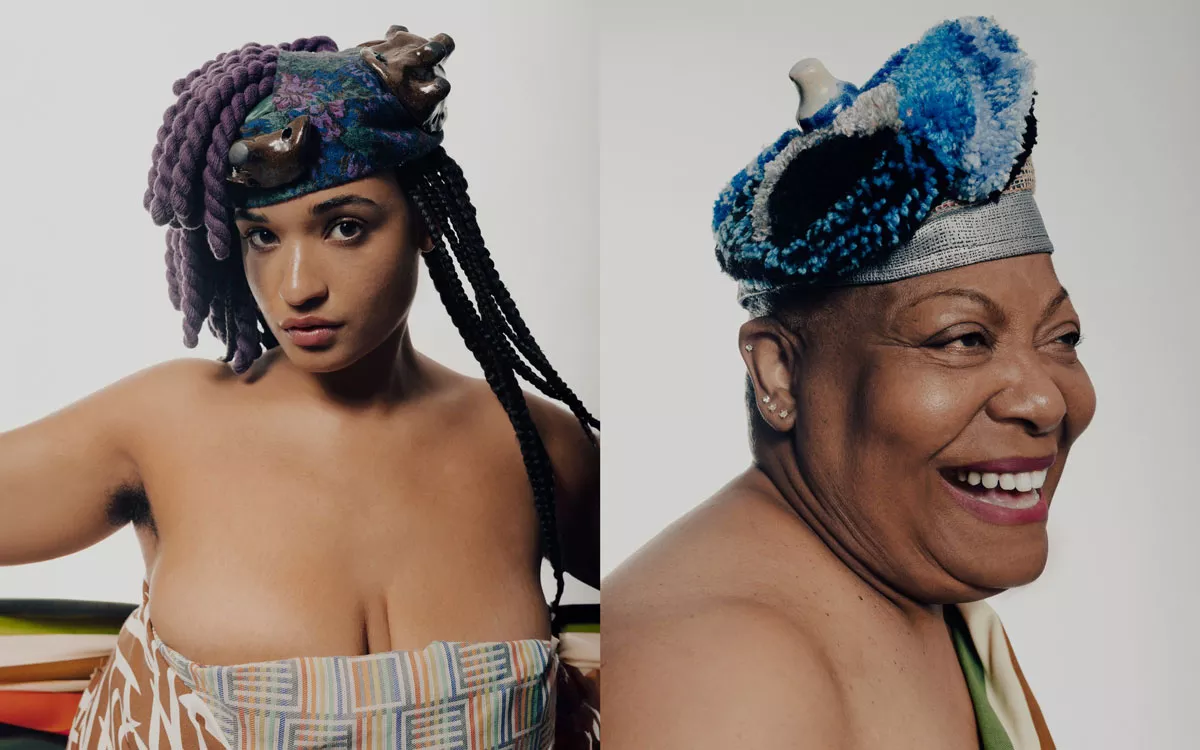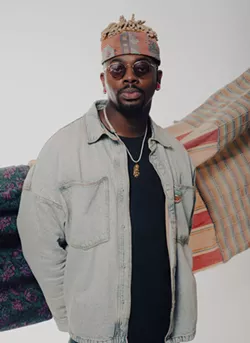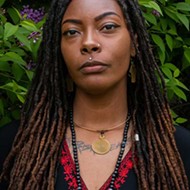For the longest time, Kwaku Osei-Bonsu’s mother was always frowning. But in a rare moment, with a fuzzy blue hat atop her head fit for an African queen, Osei-Bonsu got her to smile.
“My mother just turned 70 this year and my stepdad passed away during the pandemic, so this is the first time my mother has experienced being by herself,” he says. “But also, there’s a freedom that comes with that. She joined the Red Hatters and she’s out here really flourishing into her womanhood a bit more at this age, and I think it’s just beautiful.”
This photo of his mom is part of his first solo show at Spot Lite, Not for Sale: The Commodification of Black Success and Contribution. For the show, he’s created the headpieces, inspired by his Ghanaian heritage, for several of his close friends. Each piece is hand sewn using upcycled fabric sourced from Eastside Detroit’s Arts and Scraps and beads from Dabls African Bead Museum.
Osei-Bonsu even makes his own fringe and uses natural dyes like indigo, turmeric, and cochineal — a pigment made from insects. He calls these headpieces “whiggs,” a play on the word “wig,” as some of them look like hair extensions.
The whiggs are on display at Spot Lite along with photographs of each person they’re based on by Christian Najjar, including some glamor, abstract, and behind the scenes shots.
The headpiece and photograph of his mother is called, “I Won’t Let My Greys Turn Me Blue.”
“I wanted her to see herself in this light,” he says. “I think she had been frowning for so long, because things just weren’t working out.”
He starts the process by interviewing each subject to get a deeper understanding of their personality. This can range from what their favorite color is to what they feel is worth fighting for. Then he gets to work sewing and using ceramics to craft the pieces.
One of the pieces is inspired by his friend Amber Lewis, a social media influencer who works for the City of Detroit. Curled fringe flanks her face on either side, mimicking the horns of a ram to represent her Aries astrological sign while ceramic pieces resembling fish sit above them.
“At the time that I was making her headpiece, Amber was leading a fundraiser on Belle Isle at the aquarium,” he explains. “I created these ceramic pieces to kind of resemble the tilework that’s inside the aquarium and the fish.”
While the show is a way for Osei-Bonsu to honor his loved ones and close friends with his creative process, it also has a double meaning about the commodification of Black contributions.
“So many of these people [in the show] contribute to our society either locally, nationally, or globally, in different ways, but each of them have a story about how they were searching for self and were able to affirm themselves,” he says.
Take Imani Mixon, for example, a freelance writer (and Metro Times contributor) who Osei-Bonsu says has had to fight to find opportunities and fair pay. His piece dedicated to her is called, “I’m the Key, Be the Door.”
“Imani has been looking for ways to use her writing to branch out into other mediums, so right now she’s doing screenwriting, and things like that,” he says. “But her biggest challenge is, ‘I have all these skills and talents, where are the opportunities? Why aren’t they paying me what I’m worth? Why aren’t they giving me what I’m asking for?’”
For Osei-Bonsu’s part, the commodification of Black contributions and his interest in headpieces go back to his upbringing in the Christian church. He was not only inspired by the elaborate church hats women of the congregation wore, he felt safest around these women. But he also came out as gay when he was 16 and noticed the hypocrisy in how he was treated as a young gay man.
“In my flamboyance, they saw my gifts,” he says about the church he ladies. “I grew up dancing [and] I was liturging all up and through the church! They loved my gifts… but often people like what we contribute, but they don’t like us and I felt that when I was in church. You love when I’m dancing in the pulpit. You love when I’m on the praise team. You love when I’m an usher on the usher board, but as soon as I show up as just me, there’s a problem.”
Osei-Bonsu learned hat making during an apprenticeship at a local hat shop called Stef-n-Ty. Prior to focusing more on his whiggs, however, he worked in the food space. He’s the founder of Detroit Black Restaurant Week and owner of EastEats, the geodesic dome restaurant in Jefferson Chalmers that operated from 2020-2022 as a response to indoor dining restrictions. He also operated a similar dome restaurant concept in Idlewild at Morton’s Motel for a few years, but found running the restaurants exhausting with unique challenges.
“At EastEats we had a two-year permit and it expired then my business partner and I went our separate ways… and I just didn’t have the energy to run both and fight for rezoning because EastEats is on a residential lot,” he says. “I wasn’t mad at it because at the time, I never really got to process the pandemic. My stepdad died during the pandemic and once everything started to settle down, I think it all started to hit me.”
He adds, “Profit margins in a restaurant are [slim] and one mistake of pricing or execution, like, it’s a wrap. So when I see people running a restaurant, I’m like, ‘You’re doing that!’ Because I tried it and that was not it. It was not cute and it wasn’t fun.”
Osei-Bonsu still owns the lots EastEats sits on, which he purchased from the Detroit Land Bank for $100 and is thinking about new ways to use the land. He’s considering building tiny homes or a “third space” for people in the neighborhood to hang out.
“Most of the vacant land in Detroit is on the Eastside,” he says. “I’m a land use advocate and I really do think that there’s an opportunity for Detroit to support businesses that are in residential zones where their sole purpose is to provide dollars for the people that live within, like, a certain block radius.”
He may also relaunch Black Restaurant Week in the future with a rebrand and new focus, but for now he’s focusing on his whiggs. And no, they’re not for sale, although the photographs in the show are.
Not for Sale: The Commodification of Black Success and Contribution is on view at Spot Lite from Jan. 26-March 30. An opening reception is set for Friday, Jan. 26 from 6-9 p.m. with an artist talk moderated by Imani Mixon at 6 p.m. and an afterparty from 9 p.m. to 2 a.m.
Subscribe to Metro Times newsletters.
Follow us: Google News | NewsBreak | Reddit | Instagram | Facebook | Twitter









